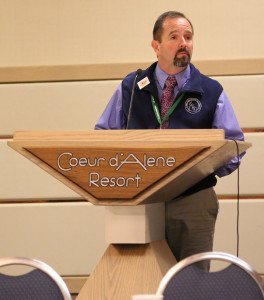Idaho school board members passed 10 of the 12 resolutions they considered Friday morning, including a measure designed to replace Common Core-aligned assessment tests.
Resolutions represent the opinion of the Idaho School Boards Association, largely for legislative purposes. Resolutions adopted at the annual convention remain policy of the ISBA for two years.
About 400 board members from most every district and charter in Idaho voted on the resolutions. The votes are weighted — larger districts have more votes than smaller ones. Board members were in Coeur d’Alene for their annual three-day convention that typically ends with the adoption of resolutions, considered one of ISBA’s most important functions.
They also elected a new president, Moscow Charter school board member John Menter. He will become the first charter school board member to serve in this leadership role. Charters only last year were permitted to join the ISBA as full voting members.

Menter won a three-way race against West Ada’s Mike Vuittonet and Boise’s A.J. Balukoff. (Click here to read more about Menter).
One of the two resolutions that failed was the Lewiston School District’s attempt to gain support for a local option sales tax to pay for school facilities. In Lewiston, three school facilities bonds have failed in the past decade after falling short of the two-thirds supermajority requirement needed for passage.
Lewiston board member Brad Cuddy asked the membership to vote in favor of the resolution because “we’re just looking for more tools.”
At least 15 board members spoke in favor of or against the resolution, which failed in a close vote.
Boise School District board member Nancy Gregory sponsored a resolution that would remove student passage of the Smarter Balanced Assessment Consortium (SBAC) as a high school gradation requirement and start a process for evaluating the future of the test. She said the SBAC doesn’t inform parents or drive instruction.
The resolution passed overwhelmingly, 3,390-350.
A resolution intended to save district’s money brought forth by Castleford also passed the membership. Castleford board members want to change how school officials are required to publish legal notices of elections and budget hearings. They support the option to publish legal notices on their website, instead of in a local newspaper, which is required by Idaho code.
Superintendent Lyle Bayley said the change would benefit all districts because newspaper legal notices can be costly. The ISBA will now lobby the 2016 Legislature to amend Idaho code to allow website posting alternatives to traditional newspaper public notice postings.
Resolutions that passed:
Election signature consistency: Traditional school board trustee candidates and write-in trustee candidates must meet all the same electorate requirements, except for the supportive signatures. Requiring write-in candidates to submit qualified elector signatures of support creates consistency and shows the candidate has support from within the zone.
Discussion of sale of public property within executive session: A school district would be able to discuss the sale of real property and its acceptance of counteroffers within executive session.
Extra-day contracts: Idaho Code does not define extended days for pupil personnel or professional-technical education instructors or address how they are paid for and assigned, making them ineligible for supplemental contracts because they include compensation for duties related to their regular school assignment. Local school boards should have the flexibility and authority to establish contracts for extended days.
Optimize reimbursements to the school-based Medicaid program: Idaho should incentivize districts to maximize Medicaid reimbursements, not discourage participation.
Parental rights: Recommends the Legislature resist the recent parental rights law and clarify its meaning.
Teacher and principal evaluation planning timeline: Administrators across the state need adequate time to receive and analyze data in which to evaluate certificated staff using student data that is timely and meaningful. The current timeline set forth in Idaho Code is limiting this ability for analysis and use in developing plans that would foster student growth.
Administrators in districts with remote schools: Six school districts in Idaho operate a remote school site as defined by Idaho Code. The ISBA will advocate for additional administrator support for districts with remote school sites.
Beyond the Smarter Balanced Assessment Consortium (SBAC): Recommend removing student passage of the SBAC as a high school graduation requirement, adhering only to required federal grade-level testing guidelines, and begin the work to prioritize the criteria for an assessment that will provide meaningful data to better inform and improve instruction.
Information on past job performance requirements: It is recommended that a document be created that consists of a check box format asking the employer to identify whether their past employee had anything within the applicant’s personnel file that is listed within Section 33-1210 (2)(b), Idaho Code. This document would be utilized rather than requesting the entire personnel file and more information could be requested if needed.
Resolution that failed:
Public works construction: Allow flexibility to hire local contractors for facilities work instead of selecting low bids.
Click here for complete details on the proposed resolutions — No. 3 and No. 11 were the only two that failed by a membership vote.
